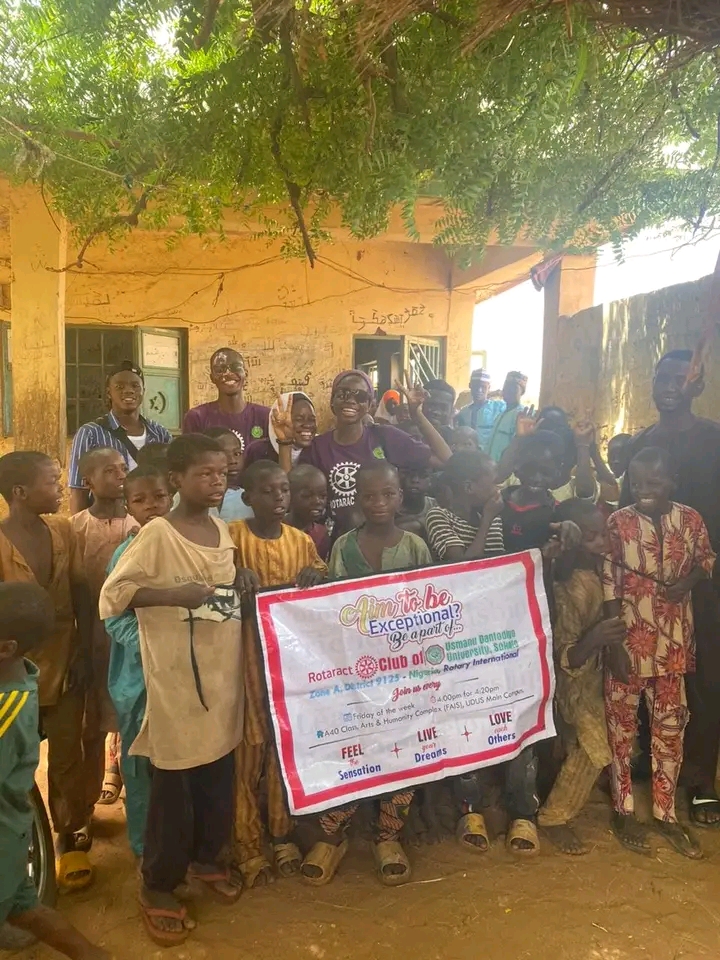The “Shoe a Child” project by the Rotaract Club of Usmanu Danfodiyo University, Sokoto, has provided essential footwear for Almajiris living around the University community. Taofeeq Imam reports how the initiative has not only protected the children’s feet but also uplifted their spirits, offering a glimmer of hope amidst their daily struggles. However, the journey to improve the lives of these vulnerable children is far from over, requiring sustained community and governmental efforts
Under the blazing Sokoto sun, the streets of Shama village, near Usmanu Danfodiyo University, are often filled with the sight of Almajiri children wandering barefoot. Abandoned by their families and having nowhere to stay, these Yaro (boys) and Yarinyan (girls) as they are popularly called face daily challenges of survival.
Aside from begging for alms, they engaged themselves in most slavery chores such as washing clothes, helping with heavy pieces of luggage, and fetching water for a meagre income. These children are malnourished, homeless, seeking shelter and barefooted seeking a way to curb their sufferings.
A glimpse into their lives
For these children, the absence of footwear is not just a discomfort but a barrier to their safety and well-being. They roam the harsh, hot streets without protection, making them vulnerable to injuries, infections, and the constant struggle against the elements.
Jamilu Abubakar, 12, shares his experience with ASHENEWS in Hausa, “I’ve been walking barefoot for as long as I can remember. The hot ground burns my feet, and sometimes I step on sharp objects. It makes it hard to move around.”

Similarly, Muhammad Yusha’u, also 12, recounts the toll of the scorching sun on his feet, “The heat is unbearable. My feet have toughened over time, but the pain never really goes away.”
According to the 2023 report by the United Nations Children’s Fund, 300,00 children are malnourished in Sokoto State. The majority of the children in Sokoto state struggle for survival amidst hunger and malnutrition.
A ray of hope: The “Shoe a Child” initiative
To alleviate some of the hardship faced by the Almajiris, the Rotaract Club of Usmanu Danfodiyo University, Sokoto, launched the “Shoe a Child” project at Gidan Marayu in Shama village. This initiative aims to provide essential footwear to the needy Almajiri children, ensuring they have the protection they need to walk safely and comfortably.
Hozaifah Basit, a member of the Rotaract Club, explains the motivation behind the project, “Seeing these children walking barefoot every day touched our hearts. We knew we had to do something to help, even if it was just providing shoes.”
The project saw the distribution of 30 pairs of shoes to the Almajiris in the community. For many, it was the first time they had ever owned a pair of shoes. The joy and relief were palpable.
Jamilu’s face lit up as he received his new shoes, “They came to our community, gave us shoes, and biscuits, and even took pictures with us. I felt like a celebrity. These shoes mean so much to me because now I can walk without pain.”
Muhammad also expressed his gratitude, “I am overjoyed. These shoes have changed my life. I can now walk comfortably, and I’m so thankful for the kindness shown to us.”
The broader impact
The initiative not only provided physical relief but also boosted the Almajiris’ spirits, offering them a sense of dignity and hope. The Club’s President, Rotaractor Sheu Fatimoh Bolanle, noted, “I feel fulfilled seeing these children smile and walk with confidence. It is a reminder that even small acts of kindness can make a big difference.”
For Ibrahim Kasimu, 13, the shoes were more than just footwear; they were a shield against the harsh realities of their environment. “These shoes will protect me from the hot ground and sharp objects. I can now move around freely without worrying about hurting my feet,” he said.
Challenges and the road ahead
Despite the success of the “Shoe a Child” project, many challenges remain. Hunger, malnutrition, and lack of shelter are still pressing issues for these children. UNICEF report showed that about 300,000 children in Sokoto State are malnourished and still struggling for survival amid poverty and neglect.
Akinola Adekunle Saheed, a sociologist and human rights activist, highlights the need for comprehensive strategies to support these children, “Community-led interventions, universal education programs, and efforts to reduce child labour are crucial. We must address the root causes, including high birth rates and lack of education, to provide these children with a better future.”


